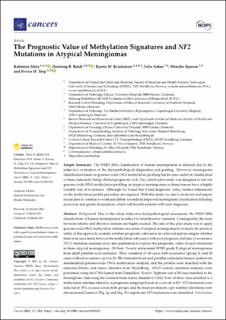| dc.contributor.author | Meta, Rahmina | |
| dc.contributor.author | Boldt, Henning B. | |
| dc.contributor.author | Kristensen, Bjarne W. | |
| dc.contributor.author | Sahm, Felix | |
| dc.contributor.author | Sjursen, Wenche | |
| dc.contributor.author | Torp, Sverre Helge | |
| dc.date.accessioned | 2021-04-06T12:34:10Z | |
| dc.date.available | 2021-04-06T12:34:10Z | |
| dc.date.created | 2021-03-14T20:35:09Z | |
| dc.date.issued | 2021 | |
| dc.identifier.issn | 2072-6694 | |
| dc.identifier.uri | https://hdl.handle.net/11250/2736405 | |
| dc.description.abstract | Background: Due to the solely subjective histopathological assessment, the WHO 2016 classification of human meningiomas is subject to interobserver variation. Consequently, the need for more reliable and objective markers are highly needed. The aim of this pilot study was to apply genome-wide DNA methylation analysis on a series of atypical meningiomas to evaluate the practical utility of this approach, examine whether prognostic subclasses are achieved and investigate whether there is an association between the methylation subclasses with poor prognosis and time to recurrence. NF1/2 mutation analyses were also performed to explore the prognostic value of such mutations in these atypical meningiomas. Methods: Twenty intracranial WHO grade II atypical meningiomas from adult patients were included. They consisted of 10 cases with recurrence (group I), and 10 cases without recurrence (group II). The formalin-fixed and paraffin-embedded tissues underwent standardized genome-wide DNA methylation analysis, and the profiles were matched with the reference library and tumor classifier from Heidelberg. NF1/2 somatic mutation analyses were performed using the CNSv1panel from Düsseldorf. Results: Eighteen out of 20 cases matched to the meningioma class using the common brain tumor classifier (v11b4). Four of these cases matched to a methylation subclass related to a prognostic subgroup based on a cut-off of 0.9. NF2 mutations were detected in 55% of cases across both groups, and the most prominent copy number alterations were chromosomal losses of 22q, 1p and 14q. No significant NF1 mutations were identified. Conclusions: Genome-wide DNA methylation profiling represents a useful tool in the diagnostics of meningiomas, however, methodological adjustments need to be addressed. | en_US |
| dc.language.iso | eng | en_US |
| dc.publisher | MDPI | en_US |
| dc.rights | Navngivelse 4.0 Internasjonal | * |
| dc.rights.uri | http://creativecommons.org/licenses/by/4.0/deed.no | * |
| dc.title | The prognostic value of methylation signatures and NF2 mutations in atypical meningiomas | en_US |
| dc.type | Peer reviewed | en_US |
| dc.type | Journal article | en_US |
| dc.description.version | publishedVersion | en_US |
| dc.source.journal | Cancers | en_US |
| dc.identifier.doi | 10.3390/cancers13061262 | |
| dc.identifier.cristin | 1897973 | |
| dc.description.localcode | Copyright: © 2021 by the authors. Licensee MDPI, Basel, Switzerland. This article is an open access article distributed under the terms and conditions of the Creative Commons Attribution (CC BY) license (https:// creativecommons.org/licenses/by/ 4.0/). | en_US |
| cristin.ispublished | true | |
| cristin.fulltext | original | |
| cristin.qualitycode | 1 | |

